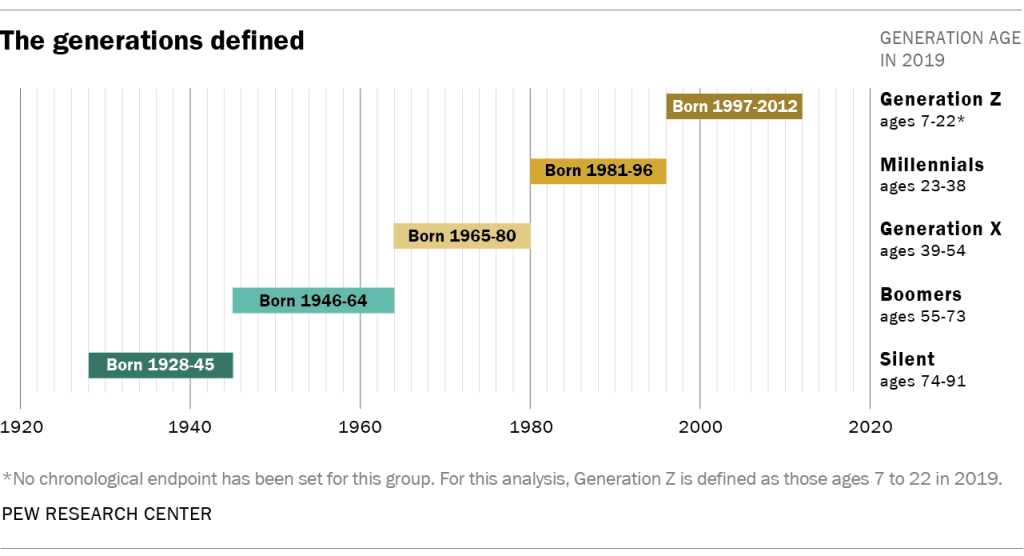A workplace is more than just a physical space. It is an environment that shapes our lives and impacts our well-being.
In this post, we’ll explore the key elements that contribute to an exceptional work culture: good work/life balance, learning and development opportunities, rewarding remuneration, fostering a positive culture, and avenues for progression.
1. Good Work-Life Balance:
What does good work-life balance look like? Imagine a workplace that values the importance of personal well-being and family commitments, where employees feel supported and empowered to strike a healthy balance between work and life. Cultivating work- life balance allows individuals to recharge, leading to increased productivity, creativity, and overall job satisfaction.
Employers need to understand that going forward a larger proportion of the active workforce would be Millennials and Gen Zs. Who are these people?
Pew Research Center has used generational cohorts to analyse changes in public attitudes over time. They decided to define the Millennial generation as individuals born between 1981 and 1996, with those born from 1997 onward considered part of a new generation. Generation Z has become the popular term for the post-Millennial generation. Generational cutoff points are tools for analysis, and the boundaries are not arbitrary but based on key political, economic, and social factors. Generations are diverse and complex groups, and differences within generations can be as significant as differences across generations.

Deloitte’s 12th annual Gen Z and Millennial Survey collected feedback from more than 22,000 respondents across 44 countries to delve into their perspectives on work and the world. The survey revealed notable shifts in the attitudes of Gen Zs and millennials. They are now more content with their work-life balance and perceive progress in terms of diversity, equity, inclusion, and efforts to combat climate change by their employers. The COVID-19 pandemic triggered a reevaluation of work-life balance, resulting in the Great Resignation phenomenon, where employees wielded more power and demanded higher pay, accountability, and workplace flexibility. However, the past few years have also left negative impacts, including a soaring cost of living, and mental health challenges, which disproportionately affect Gen Z and millennial respondents. General practices also employ Gen Zs and millennials, who are rethinking the role of work, prioritising remote and hybrid work options, and maintaining high expectations for practices to address social and environmental issues. Hence a commitment from practices to touch on these issues would foster joy in work.
2. Learning and Development Opportunities:
A workplace culture that nurtures continuous learning and personal growth is one that thrives. Employees yearn for opportunities to expand their knowledge, develop new skills, and stay ahead of the curve. Organisations that invest in professional development programs, mentorship initiatives, and provide access to resources and training pave the way for employee growth, resulting in a highly motivated and engaged workforce.
3. Reward and Remuneration:
Recognising and rewarding employees for their contributions not only bolsters morale but also serves as a powerful motivator. A culture that values and acknowledges hard work through fair remuneration, incentives, and appreciation programs creates an environment of trust and loyalty. When employees feel their efforts are valued and adequately compensated, it fuels their commitment and dedication to the organisation’s goals. Is there a possibility that primary care partnerships could have the financial flexibility for a professional bonus system to be introduced? It would be worth a discussion at your next strategy meeting.
4. Positive Culture:
A positive work culture is the bedrock of a thriving workplace. It encompasses an environment where respect, civility, inclusivity, and collaboration are at the forefront. Cultivating a positive culture requires fostering open communication channels, encouraging teamwork, and celebrating diversity. When employees feel heard, supported, and valued, they are more likely to embrace challenges, think creatively, effectively and build strong relationships within the organisation.
5. Opportunities to Progress:
The desire to grow and advance in your career is a natural aspiration for every professional. A workplace culture that provides clear pathways for progression, such as internal promotions, or skills-based development, fosters a sense of purpose and engagement among employees. By empowering individuals to achieve their goals and reach their full potential, primary care could create a sense of loyalty.
6. Staff engagement:
Primary care organisations could learn a lot from other industries that have shown the benefit of setting up staff engagement strategies that reflect a positive culture. Some examples to consider include but are not limited to:
i. Avoid excessive criticism: Use positive postcards. It may take several months for staff to accept them as genuine . Some people wouldn’t get why its good to thank people to do their job.
ii. Values and behaviour meetings: This provides a platform for individuals to deepen their understanding of values, ethics, and behavioral change while fostering meaningful connections and personal growth within a practice of like-minded individuals.
iii. Coffee catch up / ice cream: Where it is not possible to have a regular coffee break, you could march people in pairs or trios and the practice pays for their coffee on some occasion. You can pair staff who have genuine carer responsibilities outside work e.g parents of disabled children to allow for shared experience and understanding.
iv. Ask staff regularly to share something they have done that were exceptional and print the stories on posters for staff room or online magazine.
v. Create Staff Away day for staff meeting/ training , for charity events etc.
7. Use Technology:
Embrace and retain technology that improves your operations, enhances staff communication and simplifies collection of regular staff feedback. Read more about how to leverage digital platforms for real time staff feedback analysis in general practice.
Building an exceptional work culture is a journey that requires intention, dedication, and a deep understanding of what truly motivates and brings fulfilment to employees. By prioritising elements such as work-life balance, learning and development opportunities, rewarding remuneration, a positive culture, and avenues for progression, organisations can create an environment that inspires passion, creativity, and commitment. In such a culture, employees thrive, contributing their best efforts and achieving remarkable results.




Hello! This is my first visit to your blog!
We are a team of volunteers and starting a new initiative in a
community in the same niche. Your blog provided us useful information to work on. You have
done a extraordinary job!
Thanks for the feedback. I’m glad you found the resource useful. Best wishes in your project.
Saved as a favorite, I love your blog!
Thank you so much. I’m glad you found it helpful.